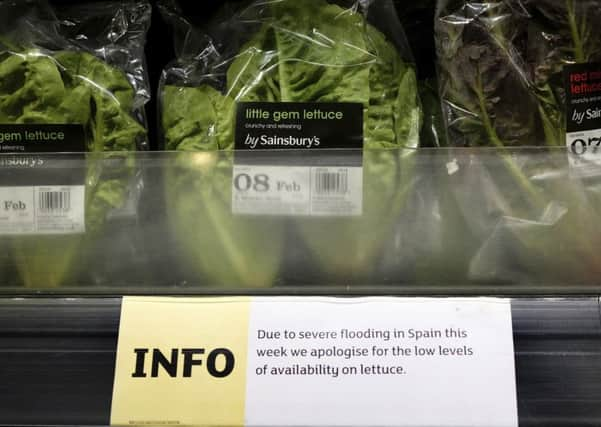Ilona Amos: Let's eat fresh seasonal food that's grown at home


I remember when we got a third television channel. The first time I tried a kiwi fruit was also a seminal moment. Not home-grown of course, despite the so-called sub-tropical climate. Most of the country had probably been enjoying these oriental superfruits for years, but my family went a bit mad for them.
Nowadays, though, we have all got used to having year-round supplies of all manner of exotic fare – even in Plockton. So I never imagined there could be a day when folk might have to prepare for battle ahead of the weekly supermarket shop. Who would have thought there could be a Black Friday-style run on salad?
Advertisement
Hide AdAdvertisement
Hide AdBut it’s true. Rationing of iceberg lettuce has been implemented in some of the major outlets as a result of shortages. And this comes hot on the heels of the much-reported courgette crisis, which has seen grocers charging three or four times the usual price for a crate of the green veg due to scarcity of supplies from abroad.
And that’s only the tip of the floating glacial mountain. Supplies of other vegetables, including peppers, broccoli, tomatoes, aubergines and spinach, have also been hit due to what is being described as a “perfect storm” of dreadful weather conditions in Europe and a devalued pound.
Importers are warning the situation could get much worse, with the bill for some fresh produce predicted to hit record levels - a potential 140 per cent hike in the cost of courgettes, 122 per cent for broccoli and 63 per cent for some lettuce varieties. Frozen food is likely to feel the pinch soon too, after losses in pea harvests due to flooding in growing regions.
Worryingly, importers say the impact of Brexit is likely to compound the problem, with many of our favourite food and drinks to be affected. Don’t panic yet, but supply chain difficulties and hikes in duty could see the price tag for shopping list ‘essentials’ such as beer, wine, coffee and chocolate going up.
There’s only one thing for it. We must return to our roots – in more ways than one.
The menu of days gone by would have been a limited bill of fare but a pretty healthy one. It would have been made up of local foods: oats, root vegetables such as turnips and potatoes, leeks, cabbage and kale; butter, cheese and other dairy products; fish, shellfish and seaweed; meat and game; various berries; and wild plants such as nettles, sorrel and garlic.
Increasing globalisation and intensification of agriculture has allowed us to become a bit food-obsessed and accustomed to being able to get what we want when we want.
Scots are not known for our healthy diet, certainly not in the past century. The legacy of our penchant for sugary drinks and fatty food is a reputation as the sick man of Europe. This is despite our country producing some of the finest and most nutritious raw ingredients available, anywhere in the world.
Advertisement
Hide AdAdvertisement
Hide AdWe need to return to eating home-grown, seasonal food. Not only is this good for our health, it also supports Scottish workers and it’s better for the environment because it has a smaller carbon footprint than imports.
At this time of year farmers in the UK grow cabbage, cauliflower, potatoes, red cabbage, swede, turnips, beetroot, sprouts, kale, celeriac, chicory, fennel, Jerusalem artichokes, leeks and parsnips. That’s a good selection. And if you can’t live without salad in winter, apparently kale can be used as a lettuce substitute.